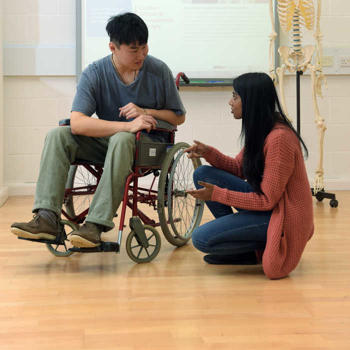
Ms Jou Yin Teoh
Senior Lecturer (Education) in Occupational Therapy
Mary Seacole
- Email: jouyin.teoh@brunel.ac.uk
- Tel: +44 (0)1895 267700
- Occupational Therapy
- Occupational Therapy
- Department of Health Sciences
- College of Health, Medicine and Life Sciences
Research area(s)
- occupational therapy workforce learning and development
- global public health and health promotion relevant to occupational therapy practice
- co-production and participatory approaches, including the Kawa Model
Research grants and projects
Research Projects
Grants
Funder: Elizabeth Casson Trust
Duration: November 2021 - March 2027
This project uses a participatory case study approach to examine how learning in superdiverse environments contributes towards the development of conviviality and critical intercultural responsiveness in the praxis of future healthcare professionals / occupational therapists - and how their learning translates into superdiverse practice settings.
Funder: Brunel University London
Duration: October 2021 - October 2022
To understand extent of discrimination faced by students from minority ethnic groups on clinical practice placements and develop a rights-based pathway to enhance student support across the Department of Health Sciences, focusing initially on the BSc Physiotherapy, BSc Occupational Therapy and MSc Physician Associate, and MSc Social Work programmes.
Funder: Brunel University London
Duration: October 2021 - October 2022
Epistemic dominance of Western, Educated, Industrialised, Rich, Democratic (WEIRD) societies due to the influence of colonialism / imperialism from countries like the USA and UK historically perpetuated and exacerbated various inequities in the professions / fields of Psychology and Occupational Therapy, including educational inequities related to race. To address these educational inequities, the Psychology and Occupational Therapy Divisions at the College of Health, Medicine and Life Sciences (CHMLS) in Brunel University London (BUL) have developed and implemented concurrent but independent interventions during the 2020 / 2021 academic year which have the shared purpose of disrupting WEIRD epistemic dominance. While both divisions have continued to implement these interventions this academic year, the impact of these educational interventions on student race-ethnicity awarding gaps has yet to be determined. This project aims to refine the above-mentioned educational interventions in relation to addressing the specific educational inequity of the race-ethnicity awarding gap, through understanding the impact of these interventions on the quality of racially minoritized undergraduate students’ relationships with their educators.


